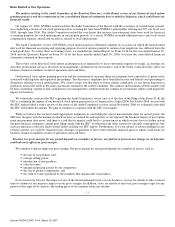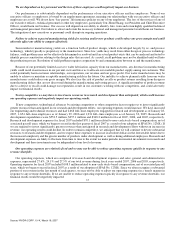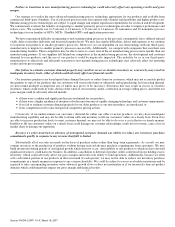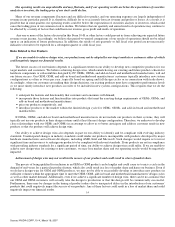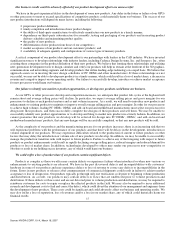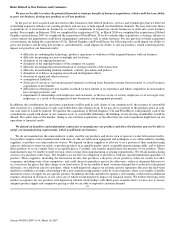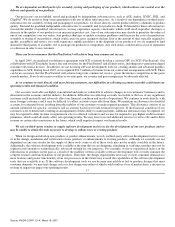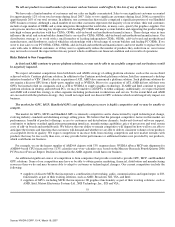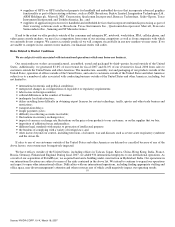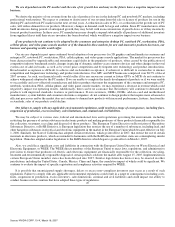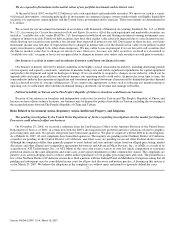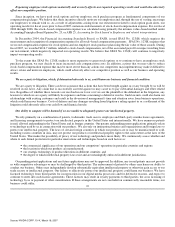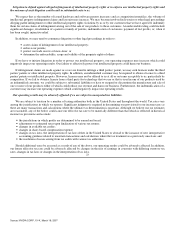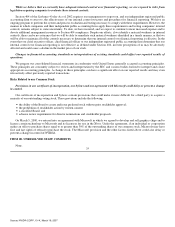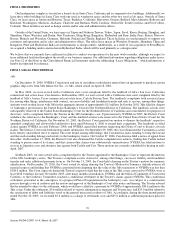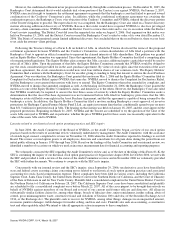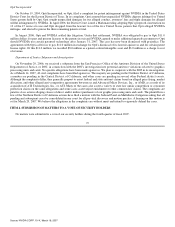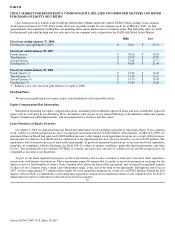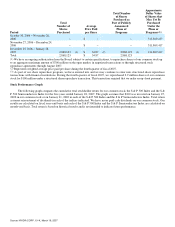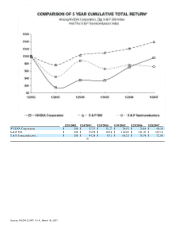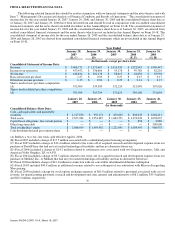NVIDIA 2007 Annual Report Download - page 27
Download and view the complete annual report
Please find page 27 of the 2007 NVIDIA annual report below. You can navigate through the pages in the report by either clicking on the pages listed below, or by using the keyword search tool below to find specific information within the annual report.
We are exposed to fluctuations in the market values of our portfolio investments and in interest rates.
At the end of fiscal 2007, we had $1.12 billion in cash, cash equivalents and marketable securities. We invest our cash in a variety
of financial instruments, consisting principally of investments in commercial paper, money market funds and highly liquid debt
securities of corporations, municipalities and the United States government and its agencies. These investments are denominated in
U.S. dollars.
We account for our investment instruments in accordance with Statement of Financial Accounting Standards No. 115, or SFAS
No. 115, Accounting for Certain Investments in Debt and Equity Securities. All of the cash equivalents and marketable securities are
treated as “available−for−sale” under SFAS No. 115. Investments in both fixed rate and floating rate interest earning instruments carry
a degree of interest rate risk. Fixed rate debt securities may have their market value adversely impacted due to a rise in interest rates,
while floating rate securities may produce less income than expected if interest rates fall. Due in part to these factors, our future
investment income may fall short of expectations due to changes in interest rates or if the decline in fair value of our publicly traded
equity investments is judged to be other−than−temporary. We may suffer losses in principal if we are forced to sell securities that
decline in market value due to changes in interest rates. However, because any debt securities we hold are classified as
“available−for−sale,” no gains or losses are recognized due to changes in interest rates unless such securities are sold prior to maturity.
Our business is cyclical in nature and an industry downturn could harm our financial results.
Our business is directly affected by market conditions in the highly cyclical semiconductor industry, including alternating periods
of overcapacity and capacity constraints, variations in manufacturing costs and yields, significant expenditures for capital equipment
and product development and rapid technological change. If we are unable to respond to changes in our industry, which can be
unpredictable and rapid, in an efficient and timely manner, our operating results could suffer. In particular, from time to time, the
semiconductor industry has experienced significant and sometimes prolonged downturns characterized by diminished product demand
and accelerated erosion of average selling prices. If we cannot take appropriate actions such as reducing our manufacturing or
operating costs to sufficiently offset declines in demand during a downturn, our revenue and earnings will suffer.
Political instability in Taiwan and in The People's Republic of China or elsewhere could harm our business.
Because of our reliance on foundries and independent contractors located in Taiwan and The People's Republic of China, and
because we have offices in these locations, our business may be harmed by political instability in Taiwan, including the worsening of
the strained relations between The People's Republic of China and Taiwan.
Risks Related to Government Action, Regulatory Action, Intellectual Property, and Litigation
The pending investigation by the United States Department of Justice regarding investigation into the market for Graphics
Processors could adversely affect our business.
On November 29, 2006, we received a subpoena from the San Francisco Office of the Antitrust Division of the United States
Department of Justice, or DOJ, in connection with the DOJ's investigation into potential antitrust violations related to graphics
processing units and cards. No specific allegations have been made against us. We plan to cooperate with the DOJ in its investigation.
As of March 14, 2007, 42 civil complaints have been filed against us. The majority are pending in the Northern District of California,
a number are pending in the Central District of California, and other cases are pending in several other Federal district courts.
Although the complaints differ, they generally purport to assert federal and state antitrust claims based on alleged price fixing, market
allocation, and other alleged anti−competitive agreements between us and Advanced Micro Devices, Inc., or AMD, as a result of its
acquisition of ATI Technologies, Inc., or ATI. Many of the cases also assert a variety of state law unfair competition or consumer
protection claims on the same allegations and some cases assert unjust enrichment or other common law claims. The complaints are
putative class actions alleging classes of direct and/or indirect purchasers of our graphic processing units and cards. The plaintiffs in a
few of the Northern District of California actions have filed a motion with the Judicial Panel on Multidistrict Litigation asking that all
pending and subsequent cases be consolidated in one court for all pre−trial discovery and motion practice. A hearing on this motion is
set for March 29, 2007. We believe the allegations in the complaints are without merit and intend to vigorously defend the cases.
21
Source: NVIDIA CORP, 10−K, March 16, 2007


